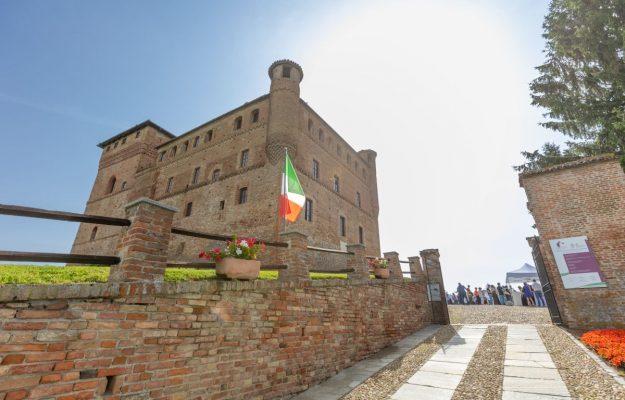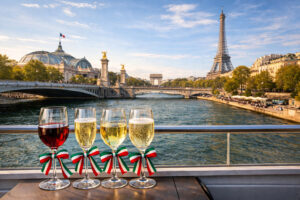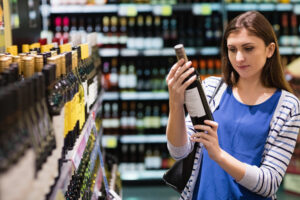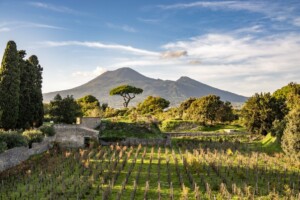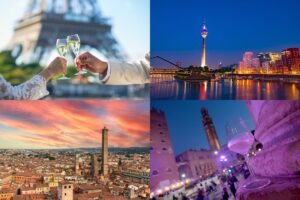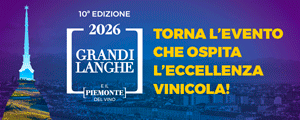Looking at international tourism data on tourist arrivals from the country where they live, Europe quickly made up for the numbers lost in the first quarter of 2023 pandemic, standing at only -10% over 2019, but the Asian market still lags behind by marking -46%. In the Old Continent, flight searches grew +30% in the first five months of 2023 over 2022, accommodation +28%, while cruises mark a real boom, with +63%. Demand to Italy is driven, in order, by Germany, the United Kingdom and the United States. This is an encouraging figure, showing the upswing in long-haul travel, particularly from a high-spending, food-and-wine-motivated country like the US. Going down to the specifics, online searches for food and wine experiences are growing, registering +13% on 2019 for wine-tasting and +17% for food-tasting (source: Google Trends). A curiosity? Across the web, Barolo is more searched than Brunello di Montalcino and Franciacorta. These are the data released by Google Italia at the “Food & Wine Tourism Forum” No. 6, in the Castle of Grinzane Cavour, promoted by Ente Turismo Langhe Monferrato Roero, under the scientific direction of Roberta Milano, and which, on June 21, brought together more than 300 experts and operators, academics, entrepreneurs, journalists and enthusiasts of the food and wine and tourism sector in the Langhe UNESCO World Heritage Site. Key concept and common thread of the Forum was “Perspectives”, in terms of sustainability, digital acceleration, climate change and structuring an increasingly competitive and smart offer in the field of food and wine tourism development. “A word, perspectives, that recalls a concept that the Ministry of Tourism has made its own from the moment it took office”, wrote the Minister of Tourism, Daniela Santanchè, in the letter of greetings sent for the opening of the “Forum”. “If the goal is to bring tourism to become the first Italian industry, we cannot but adopt a strategic approach, putting things in perspective: acting in the present, but keeping in mind the achievement of results not only in the immediate, but also and above all in the long term”.
Getting into the scientific content, Alessandra Priante, Unwto Europe director, brought to Grinzane a glimpse of the numbers on international tourism, while Google data was reported by Fabio Galetto, Travel Director Google Italy. But it was from economist Magda Antonioli, vice president Etc European Travel Commission, that the Italian perspective came instead, with some clear messages for destinations: data are important and provide indispensable information, but then it is up to governance to translate them into a useful and innovative strategy for territories, which takes advantage of all existing opportunities, starting with the Pnrr.
Guest country of honor at Forum 2023, Spain presented the "Plan de Turismo Enogastronómico," with Maria González Velasco, Cabinet Advisor to the Spanish Secretary of State for Tourism: a plan with a total budget of 68.6 million euros distributed among sustainability interventions, experience programming and international promotion. But the most important lesson coming from Spain is the sharing of a successful working method based on the constant involvement of territories and businesses, a complex but effective organizational model that includes both different vertical clusters and horizontal themes such as digital. On the sustainability theme, there was instead the testimony of Juan Luis López Vázquez, International Promotion Area Market Manager Italy Sevilla City Office: Sevilla is the "European Smart City 2023," whose complex path based on innovation and digital to support tourism was illustrated. A development model that puts citizens at the center of planning and returns both tourists and residents concrete tools of real-time information resulting in sustainable actions that combine infrastructure, mobility, flow management and energy savings. Present for the first time at the Forum, the Unesco Creative Cities discussed precisely the ability to network between culture, identity and vision. Four cities of the Gastronomy cluster met in Grinzane to tell the public how powerful networking can be, to build bridges, open new perspectives and guard their respective heritages: from Bergamo to Burgos and Rouen, passing through Alba, which did the honors.
Ample space in the Forum was naturally given to digital, Artificial Intelligence and ChatGPT applications in tourism and in the world of food and wine. This was discussed by Bto, Be Travel Onlife, the Florence-based event present at the Forum with scientific director Francesco Tapinassi and some coordinators of the different “Topics”. In the panel titled “Sapiens - Humans meet AI”, a window was opened on a future that is already a reality: ChatGPT currently has over 100 million users, in just 5 days it has surpassed 1 million users, and OpenAI gets 1 billion visits per month. And there are many generative Artificial Intelligence projects, which can generate images, video, audio and text based on received input (prompts). In food & wine, it is already being used to create personalized recipes based on the ingredients at home or suggest combinations of dishes and wine.
For the world of wine tourism, however, data from the National Wine Tourism Observatory 2023 Nomisma Wine Monitor and Wine Cities point to two issues affecting supply: differentiation of experiences (integrating dining, sports and culture) and training. 74% of wineries had difficulty finding staff in the 2021-2022 biennium, and the regions most affected by the problem are: Veneto (92%), Sicily (89%), Friuli Venezia Giulia (83%), Puglia (83%) and Piedmont (80%). Speaking of demand, the figure provided by WineAround, a software company for direct bookings on wineries' websites, is indicative. Client wineries reported +120% in revenue generated from wine tourism tickets for companies using the platform (again in the first five months 2023 compared to 2022). This is a sample of digital wineries, not representative of the universe, but it precisely demonstrates the importance of the online channel in intercepting a growing demand from tourists. On the governance front, on the other hand, Unwto brought the first data from an international survey showing the work that needs to be done to improve the sector: 65% of respondents indicate that there is no national policy, plan or strategy dedicated to wine tourism in their country, and 75% of countries do not collect periodic data on wine tourism.
In Grinzane Cavour they also talked about innovation linked to very concrete projects: the “International Fair of the White Truffle of Alba”, with managing director Stefano Mosca and the head of the Langhe Monferrato Roero Tourist Observatory, Cristina Bergonzo, presented the results of analysis based on mobile phone data and sentiment analysis of online reviews, combined with evaluations of economic impact through “spend index”. In addition, to improve quality guarantees in the sale of truffles, the National Center for Truffle Studies with manager Isabella Gianicolo told the Forum about the innovative protocol on blockchain created with Var Group and Knobs. Also featured at the Forum was the voice of Slow Food, with Italy president Barbara Nappini at the table with Paolo Corvo, director of the Laboratory of Sociology at the University of Gastronomic Sciences, and Enrico Ponza, founder in Melle of the project of care and territorial development “Gli Antagonisti”, on the “urgent challenges of the present, even before the future, which obviously concern climate change, the environmental crisis and the fight against waste”. And again on the need to build a regenerative model that takes us out of the competitive mechanism into “a perspective of concrete, possible and collective beauty, whereby we will only really save ourselves if we save all of us”.
All sold out were the 4 Toolkits of the day, or rather the section dedicated to training, particularly the development of digital skills, much appreciated by the operators who attended the classes on Email Marketing, Facebook, Instagram and Linkedin, Google Maps and Google My Business, as well as the first experience of the “World Café”, the formula of discussion tables that give rise to informal, lively and constructive conversations, which focused on undertourism, Alta Langa and brasserie tourism. Finally, at the close of the Forum, with appointment edition No. 7 given by Langhe Monferrato Roero Tourist Board president Mariano Rabino to June 21, 2024, director Bruno Bertero dialogued with Enite’s Marketing and Promotion director Maria Elena Rossi on short-term prospects. In particular on the subsequent re-planning and enhancement of the product cluster on the model already implemented for Mice tourism: Italy has climbed the world rankings and is now third globally and second in Europe with more than 520 meetings after Spain (528) and the U.S. (690).
The last act of Forum 2023, a special out-of-session program with a remote talk by Fabio Zaffagnini, creator and coordinator of the famous Rockin1000 project. Zaffagnini today manages an international community of musicians created following the success of the first collective concert, organizes events in which 1,000 musicians play at the same time, and immediately took action to help the Emilia-Romagna region affected by the flood by modifying his platform in a few hours to give it to the affected municipalities: “Volontari SOS”. The Langhe Monferrato Roero Tourist Board wanted to close the sixth edition of the Forum by letting him take the stage for the announcement of the benefit concert aimed at raising funds for Romagna and staged on July 29.
Copyright © 2000/2026
Contatti: info@winenews.it
Seguici anche su Twitter: @WineNewsIt
Seguici anche su Facebook: @winenewsit
Questo articolo è tratto dall'archivio di WineNews - Tutti i diritti riservati - Copyright © 2000/2026










